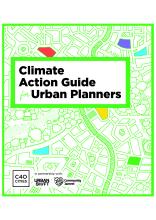Brief

Reducing Climate Impacts on Urban Sectors
This concise set of policy briefs provides an overview of climate adaptation actions cities can take within eight specific urban sectors, including energy, buildings, mobility, waste, and food systems.
In response to climate change, cities around the world are already implementing ambitious actions to reduce emissions (mitigation) alongside efforts to increase their climate resilience (adaptation) to protect citizens and infrastructure against current and future extreme weather events.
This series of policy briefs provides guidelines and examples of adaptation mechanisms to reduce climate change impacts in the urban sectors of clean energy, mass transit, new, municipal, and private buildings, waste and food systems, and active mobility. Each guide outlines the importance of integration within the relevant urban sector and includes example actions and case studies. These policy briefs were produced by C40 Cities.
Learn more
Clean Energy & Buildings Finance Academy
Hosted in Cape Town, this UrbanShift workshop brought together eight cities to discuss the promotion and financing of small-scale clean energy generation on public and private buildings.

Buenos Aires City Academy
The first UrbanShift City Academy in Latin America and the Caribbean brought together participants from 25 cities to receive training on urban biodiversity planning and management and designing vibrant, people-centric neighborhoods.

Climate Action Guide for Urban Planners
From C40, UrbanShift, and Community Jameel, this guide leads urban planners and practitioners through how to effectively infuse climate action into the development of urban plans.

Integrated Planning and Multilevel Governance: Insights from the UrbanShift National-Local Dialogue in Brazil
The UrbanShift Brazil National-Local Dialogue emphasized the critical role of integrated urban planning and multilevel governance in addressing climate challenges and fostering sustainable development across Brazil’s rapidly growing cities.
